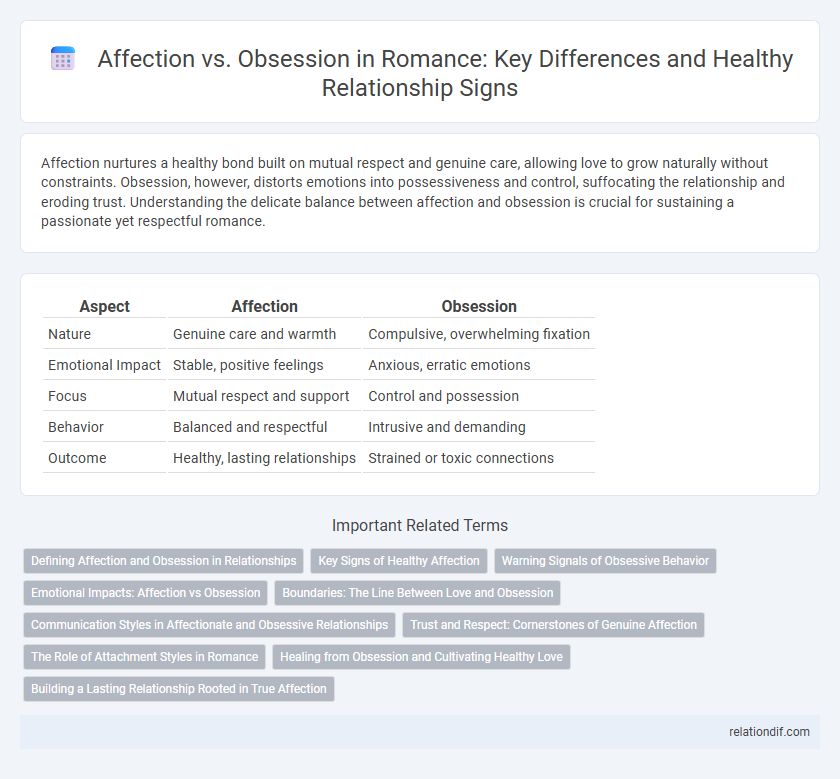Affection nurtures a healthy bond built on mutual respect and genuine care, allowing love to grow naturally without constraints. Obsession, however, distorts emotions into possessiveness and control, suffocating the relationship and eroding trust. Understanding the delicate balance between affection and obsession is crucial for sustaining a passionate yet respectful romance.
Table of Comparison
| Aspect | Affection | Obsession |
|---|---|---|
| Nature | Genuine care and warmth | Compulsive, overwhelming fixation |
| Emotional Impact | Stable, positive feelings | Anxious, erratic emotions |
| Focus | Mutual respect and support | Control and possession |
| Behavior | Balanced and respectful | Intrusive and demanding |
| Outcome | Healthy, lasting relationships | Strained or toxic connections |
Defining Affection and Obsession in Relationships
Affection in relationships reflects genuine care, respect, and emotional support, fostering trust and mutual understanding. Obsession, by contrast, involves an excessive preoccupation with a partner, often leading to jealousy, control, and emotional dependence. Understanding these distinctions helps maintain healthy romantic connections based on balance rather than fixation.
Key Signs of Healthy Affection
Healthy affection in romance is characterized by mutual respect, open communication, and emotional support, fostering trust and security between partners. Key signs include consistent care, empathetic listening, and appropriate boundaries that honor each individual's autonomy. This balance encourages growth and connection without dependence or control.
Warning Signals of Obsessive Behavior
Warning signals of obsessive behavior in romance include excessive jealousy, constant need for reassurance, and controlling tendencies that invade personal boundaries. Persistent monitoring of a partner's activities, frequent accusations without cause, and an inability to respect space indicate unhealthy attachment. Recognizing these signs early can prevent emotional harm and preserve a balanced relationship dynamic.
Emotional Impacts: Affection vs Obsession
Affection nurtures emotional well-being through mutual respect and trust, fostering deep connections that enhance happiness and security. Obsession, however, triggers anxiety and possessiveness, often leading to emotional distress and an unhealthy attachment that undermines personal boundaries. The divergent emotional impacts highlight how affection promotes balanced intimacy, while obsession risks destabilizing mental health and relationship harmony.
Boundaries: The Line Between Love and Obsession
Healthy affection respects personal boundaries, allowing partners to maintain individuality while building trust and intimacy. Obsession blurs these boundaries, often leading to possessiveness, control, and emotional dependency that undermine a balanced relationship. Recognizing and honoring limits ensures love fosters growth, whereas crossing the line risks transforming affection into harmful fixation.
Communication Styles in Affectionate and Obsessive Relationships
Affectionate relationships exhibit open, respectful communication characterized by empathy and active listening, fostering trust and emotional intimacy. In contrast, obsessive relationships often involve controlling language, frequent misunderstandings, and excessive demands for reassurance, leading to tension and emotional imbalance. Clear, balanced communication enables affection to flourish, while obsessive communication patterns signal unhealthy attachment dynamics.
Trust and Respect: Cornerstones of Genuine Affection
Genuine affection in romance is rooted in trust and respect, fostering a healthy emotional connection that nurtures growth and understanding between partners. Trust establishes a secure foundation where vulnerability is welcomed, while respect honors individual boundaries and values, preventing the emotional suffocation often present in obsession. Unlike obsession, which thrives on control and insecurity, true affection cultivates mutual support and freedom, reinforcing the stability and depth of the relationship.
The Role of Attachment Styles in Romance
Attachment styles significantly influence the boundary between affection and obsession in romantic relationships, with secure attachment fostering healthy emotional connections and anxious or avoidant styles potentially leading to obsessive behaviors. Individuals with anxious attachment may experience intense fear of abandonment that manifests as obsession, while those with avoidant attachment might struggle to maintain intimacy, complicating emotional balance. Understanding these dynamics helps partners cultivate mindful affection, preventing the escalation into unhealthy obsession and promoting lasting romantic bonds.
Healing from Obsession and Cultivating Healthy Love
Healing from obsession requires recognizing the difference between possessive attachment and genuine affection, focusing on emotional boundaries and self-awareness. Cultivating healthy love involves nurturing mutual respect, trust, and open communication to build lasting connections. Prioritizing personal growth and empathy helps transform obsessive patterns into balanced, supportive relationships.
Building a Lasting Relationship Rooted in True Affection
True affection in a romantic relationship fosters trust, mutual respect, and emotional intimacy, essential elements for lasting connection. Unlike obsession, which often involves possessiveness and insecurity, genuine affection allows partners to grow individually and together. Prioritizing open communication, empathy, and shared values builds a foundation that sustains love beyond infatuation.
Affection vs Obsession Infographic

 relationdif.com
relationdif.com